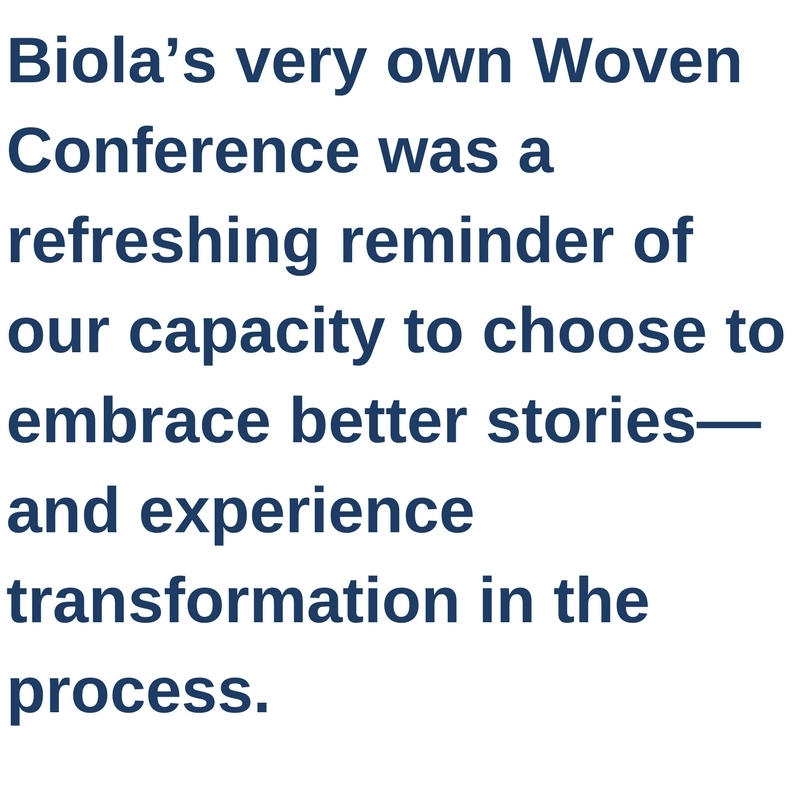I’m convinced that we are all storytellers.
We tell stories to make sense of the world around us—of our interactions, our relationships, our identities. We have stories for the Why? of others’ behavior, detailed accounts for seemingly every What if?, and confident evaluations of Who? people are. These stories aren’t necessarily false, but because they usually go unexamined, they often are.
The issue with these unexamined stories? They matter. They’re more powerful than we realize. They shape our behavior, alter the way we think about people (including ourselves), and even have the ability to change who we become (think self-fulfilling prophecy).
But we needn’t be indiscriminate in the stories we believe. Biola’s very own Woven Conference was a refreshing reminder of our capacity to choose to embrace better stories—and experience transformation in the process.
All of the speakers were, colloquially speaking, “powerhouses.” Their gifts, grit, resilience, and love for the people around them have brought them to the heights of achievement, and left them with lessons and tales to tell. Naturally, they spoke to navigating the beautiful and difficult complexities of being a Christian working woman through the lenses of their own stories.

Sarah Moore spoke to the dangers of living into the narrative of success set forth by culture at large. As she continually rose “up the ladder,” she discovered that though she had gained the world, she felt that she was missing something. It was only in ceasing from her dogged pursuit of achievement, in abandoning her “soul addiction,” and arriving at the end of herself that she experienced peace, renewed purpose, and healing. Instead of pursuing a story being written by the expectations of others, cultural ideals of success, and her own ambition, she began to pursue a story of contentment, even as she continued to use her skills to further the Kingdom in ways she hadn’t anticipated. She now acts as founder of Inquiry, LLC, a strategic consulting company focused on business development, storytelling, and executive coaching.
Rachel Sherburne spoke to the stories we tell ourselves about what life should be like—our expectations. Such expectations, she posited, are often unspoken, unrealistic, and ungodly. Together, we looked with a critical eye at the stories upheld by culture about women, stories centered on beauty and romance in which everything falls perfectly into place. In sharing her own experiences, Rachel revealed how the brokenness and pain that lace our stories can make our love deeper and our souls holier. The stories God is writing in our lives, she says, will lead us to places we never expected—say, to full-time mission work, or to a chapel in Iraq in the middle of a war—yet his story will be more fulfilling and meaningful than any story we could create.
Dr. Naima Lett, an award-winning actor, producer and author, spoke of the power we have as story-changers, people who can alter the dominant narratives of our world today. As the first female to earn a Doctorate of Ministry in Preaching at Biola University (which she puts to good use at her church plant, Hope in the Hills) and as a woman of color in a predominantly male and white-washed field, Dr. Lett is attentive to the dynamics of power and the ways these shape the narratives about what we can and cannot do. She notes that community is vital to our personal and professional development, that how we present ourselves to others will influence our interactions with them, and that the men in our lives need us to be honest for a more complete, accurate depiction of the world.
Sandy Olsson, founder of Master’s Program for Women, spoke into the importance of refusing to abide by stories of fear and investigating what we have to offer to the world at large. She believes in the importance of individuals seeking out self-knowledge, capitalizing on their strengths and not allowing themselves to be wounded by self-condemnation because their skills don’t align with those of their peers. She urges young women to be true to their stories. In facing and overcoming her personal fears, she has been able to step into a life of leadership and renewed submission to God, empowering women to see their unique purpose and pursue whatever their Master calls them to.
By stepping away from stories of culturally-constructed success, stories of “should be,” stories crafted singularly by people in positions of power, and stories dominated by fear, we are able to step into stories of contentment, stories that embrace the unexpected, stories of courage and cultural transformation, stories of becoming the people we were created to be.
In short: in surrendering the stories we have pre-written for our lives or blindly accepted as true, we can embrace a larger narrative written by a better Author, as he weaves together our roles as working, Christian women and teaches us how to worship in the workplace.
I’m convinced that we are all storytellers. But more importantly, I think we are coworkers with God in authoring the stories he is telling in and through our lives.
We don’t just tell stories. We live them.
Quick Conference Take Aways:
- Seek out mentorship. Find female professionals you admire and ask for the opportunity to learn from them—the worst they can do is say no.
- Know your strengths, and don’t apologize for them. Self-deprecation is not humility.
- Achievement it isn’t everything. Don’t let your work become your idol.
- Release control. Don’t confuse goal setting and healthy ambition with micromanaging your life. God is a better God than you are.
- Rest. Rest. Rest.
“Rest is not the reward for faithfulness. Rest is the prerequisite for fruitfulness.” – Rachel Sherburne
Hannah Williamson is a senior Communication Studies and Torrey Honors student at Biola University pursuing a career in copywriting. She loves the outdoors and coffee shops (but not coffee), and is learning how to love God and love others, choose faith in the face of fear, and embrace being ever-in-process.
 Biola University
Biola University





